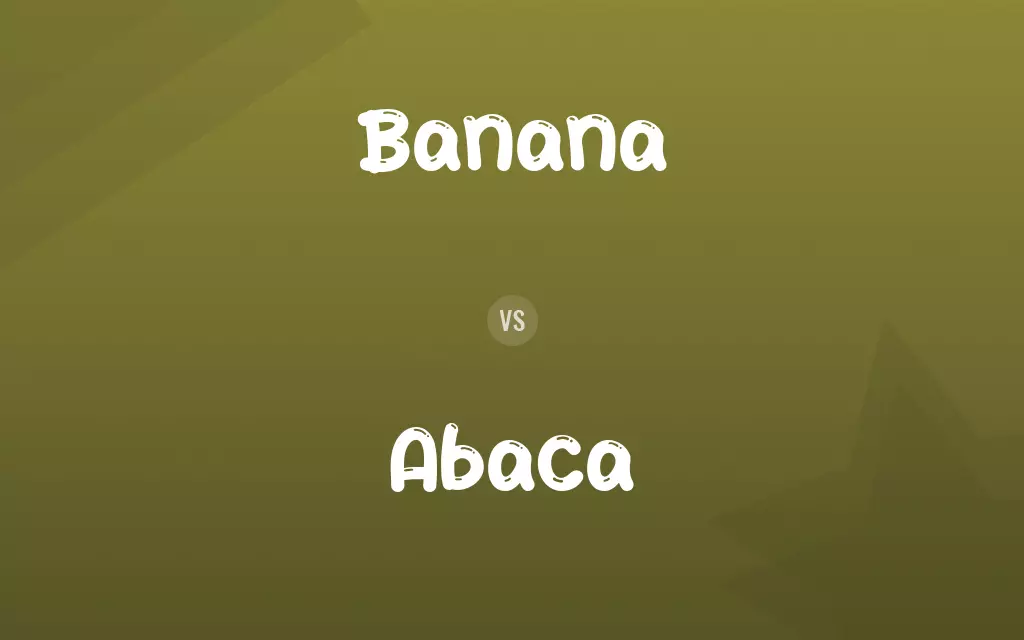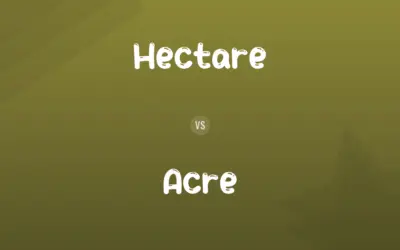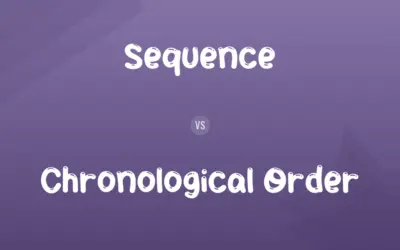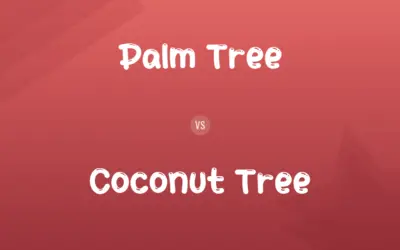Banana vs. Abaca: Difference and Comparison
Edited by Muazma Batool — By Muneeza Rehman — Updated on September 9, 2023
"Banana" is a yellow, elongated fruit consumed worldwide, while "abaca" is a plant species, native to the Philippines, known for its strong fiber used in textiles.

Difference Between Banana and Abaca
"Banana" and "abaca" are both related to the plant kingdom, but they serve very different purposes and have distinct characteristics. "Banana" is one of the most popular fruits worldwide, known for its sweet taste, nutritional value, and distinct yellow color when ripe. Its soft and edible interior contrasts with the protective outer peel which can be easily removed.
Muazma Batool
Sep 09, 2023
On the other hand, "abaca" is not recognized for its edibility but rather for its industrial use. Derived from a species of banana native to the Philippines, abaca is a fibrous material. This fiber, often termed Manila hemp, is renowned for its strength, durability, and resistance to damage from salt water, making it ideal for products such as ropes, twines, and specialized paper.
Muazma Batool
Sep 09, 2023
While both the banana and the abaca plants bear similar physical resemblances, the purposes they serve are divergent. Bananas are cultivated primarily for consumption, offering a myriad of health benefits, including being a significant source of potassium. Abaca, however, is treasured in the textile industry, with its fibers being integral in the production of certain fabrics and goods.
Muazma Batool
Sep 09, 2023
It's also noteworthy that while bananas are cultivated and enjoyed worldwide, abaca has a more localized cultivation, predominantly in the Philippines. This specialized growth is due to the unique properties and uses of its fibers, distinguishing it from the globally consumed banana fruit.
Elijah
Sep 09, 2023
Banana vs. Abaca Comparison Chart
Edibility
Edible and nutritious.
Not typically consumed; valued for its fiber.
Muazma Batool
Sep 09, 2023
Common Products
Food products like banana bread, smoothies.
Ropes, twines, specialty paper.
Nolan
Sep 09, 2023
Physical Appearance
Yellow, elongated fruit with a soft interior.
Plant with strong fibers extracted for industrial use.
William
Sep 09, 2023
Banana vs. Abaca Definitions
◉Banana
A tropical fruit with high potassium content.
Doctors recommend eating a banana for muscle cramps.
Muazma Batool
Sep 09, 2023
◉Abaca
Known for its strong, durable fiber.
The strength of abaca fibers makes them ideal for ropes.
Kaitlyn
Sep 09, 2023
◉Banana
A fruit with a protective outer peel.
She peeled the banana before eating it.
Muazma Batool
Sep 09, 2023
◉Abaca
A source of Manila hemp.
Manila hemp, derived from abaca, is used in various products.
Muazma Batool
Sep 09, 2023
◉Banana
An elongated yellow fruit when ripe.
The banana turned yellow, indicating its ripeness.
Leo
Sep 09, 2023
◉Abaca
A non-edible plant used industrially.
While it's related to the banana, abaca isn't typically eaten.
Muazma Batool
Sep 09, 2023
◉Banana
Any of several treelike plants of the genus Musa, especially M. acuminata, having a terminal crown of large, entire leaves and a hanging cluster of fruits.
Muneeza Rehman
May 03, 2023
◉Abaca
A plant species native to the Philippines.
Abaca is primarily grown in the Philippines.
Henry
Sep 09, 2023
◉Banana
The elongated, edible fruit of these plants, having a thick yellowish to reddish skin and whitish, pulpy flesh.
Muneeza Rehman
May 03, 2023
◉Abaca
A bananalike plant (Musa textilis) native to the Philippines and having broad leaves with long stalks.
Muneeza Rehman
May 03, 2023
◉Banana
An elongated curved tropical fruit of a banana plant, which grows in bunches and has a creamy flesh and a smooth skin.
Muneeza Rehman
May 03, 2023
◉Abaca
The fibers obtained from the stalks of this plant, used to make cordage, fabric, and paper. Also called manila, Manila hemp.
Muneeza Rehman
May 03, 2023
◉Banana
In particular, the sweet, yellow fruit of the Cavendish banana cultivar, which may be eaten raw, as distinct from e.g. a plantain for cooking.
Muneeza Rehman
May 03, 2023
◉Abaca
Musa textilis, a species of banana tree native to the Philippines grown for its textile, rope- and papermaking fibre.
Muneeza Rehman
May 03, 2023
◉Banana
The tropical tree-like plant which bears clusters of bananas, a plant of the genus Musa (but sometimes also including plants from Ensete), which has large, elongated leaves.
Muneeza Rehman
May 03, 2023
◉Abaca
(uncountable) The fiber of this plant, used in rope, fibers, and cloth
Muneeza Rehman
May 03, 2023
◉Abaca
The Manila-hemp plant (Musa textilis); also, its fiber. See Manila hemp under Manila.
Muneeza Rehman
May 03, 2023
◉Banana
A person of East Asian descent, especially an ethnic Chinese from a Western country who does not speak Chinese and only speaks English, considered to have overly assimilated and to be subservient to white authority, an East Asian race traitor.
Muneeza Rehman
May 03, 2023
◉Abaca
Philippine banana tree having leafstalks that yield Manila hemp used for rope and paper etc
Muneeza Rehman
May 03, 2023
◉Abaca
Cultivated for textile production.
The textile industry values abaca for its unique fiber.
Jonathan
Sep 09, 2023
◉Banana
A perennial herbaceous plant of almost treelike size (Musa sapientum); also, its edible fruit. See Musa.
Muneeza Rehman
May 03, 2023
◉Banana
any of several tropical and subtropical treelike herbs of the genus Musa having a terminal crown of large entire leaves and usually bearing hanging clusters of elongated fruits
Muneeza Rehman
May 03, 2023
◉Banana
A versatile ingredient in cooking and baking.
She made a delicious banana bread for dessert.
Muazma Batool
Sep 09, 2023
Banana vs. Abaca Frequently Asked Questions
Is abaca edible like a banana?
No, abaca is not typically consumed; it's valued for its strong fiber.
Muazma Batool
Sep 09, 2023
What is a banana primarily known for?
Banana is known as a sweet, nutritious fruit consumed globally.
Muazma Batool
Sep 09, 2023
Do both banana and abaca plants look similar?
Yes, they bear physical resemblances but serve different purposes.
Olivia
Sep 09, 2023
Are bananas and abaca the same plant?
No, while related, they are distinct, with bananas being edible and abaca being industrially valued.
Muazma Batool
Sep 09, 2023
Why is abaca fiber so sought after in the textile industry?
Abaca fiber is durable, strong, and resistant to salt water, making it ideal for various products.
Kaitlyn
Sep 09, 2023
Can bananas be used in cooking and baking?
Yes, bananas are versatile and can be used in dishes like banana bread and smoothies.
Lucas
Sep 09, 2023
Can you eat abaca like a banana?
No, abaca is not consumed for its taste but is used for its fiber.
Muazma Batool
Sep 09, 2023
Is the banana plant used in textiles like abaca?
No, while the banana plant may have some industrial uses, it's primarily cultivated for the fruit.
Henry
Sep 09, 2023
Content Creators
Written by
Muneeza RehmanAt Comparisons.wiki, Muneeza skillfully navigates the vast sea of information, ensuring clarity and accuracy as the lead content editor. With a keen eye for detail, she curates every comparison to enlighten and engage readers.
Edited by
Muazma BatoolAs a content editor, Muazma Batool is not just a grammar guru but a creative mastermind who breathes life into every word. With an eagle eye for detail and a passion for storytelling, she transforms bland text into engaging content that captivates audiences and drives results.

































